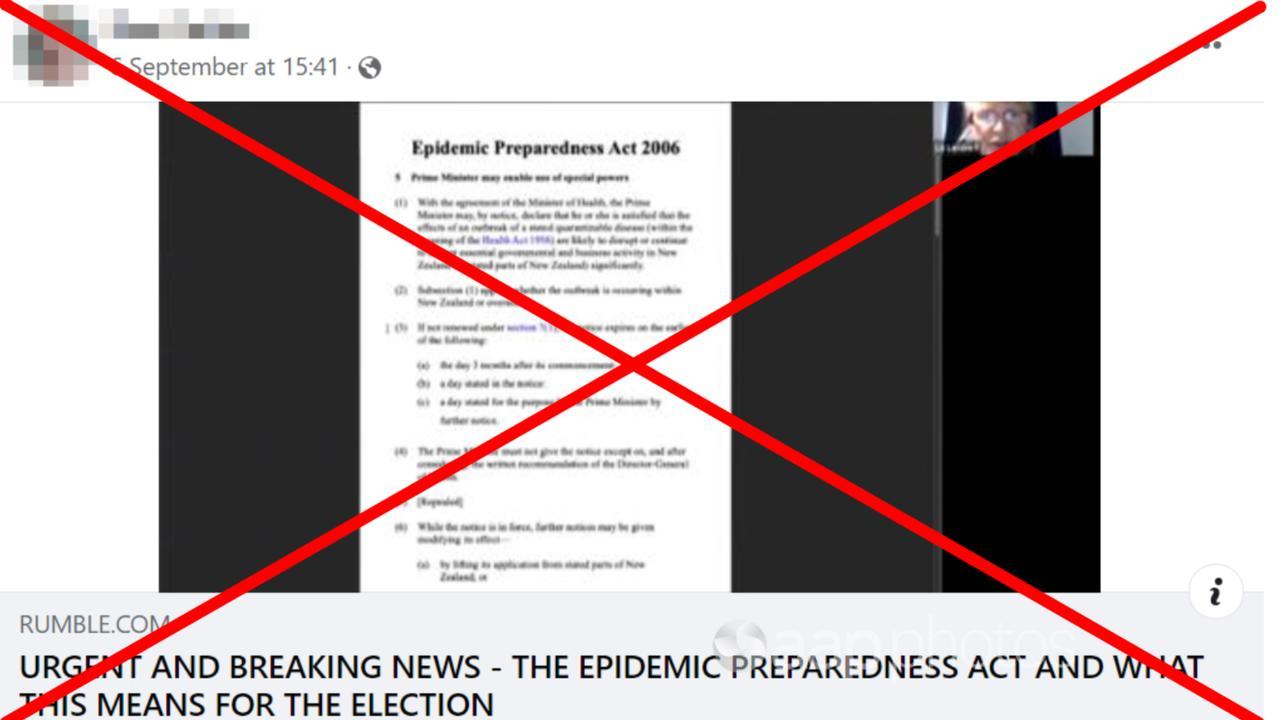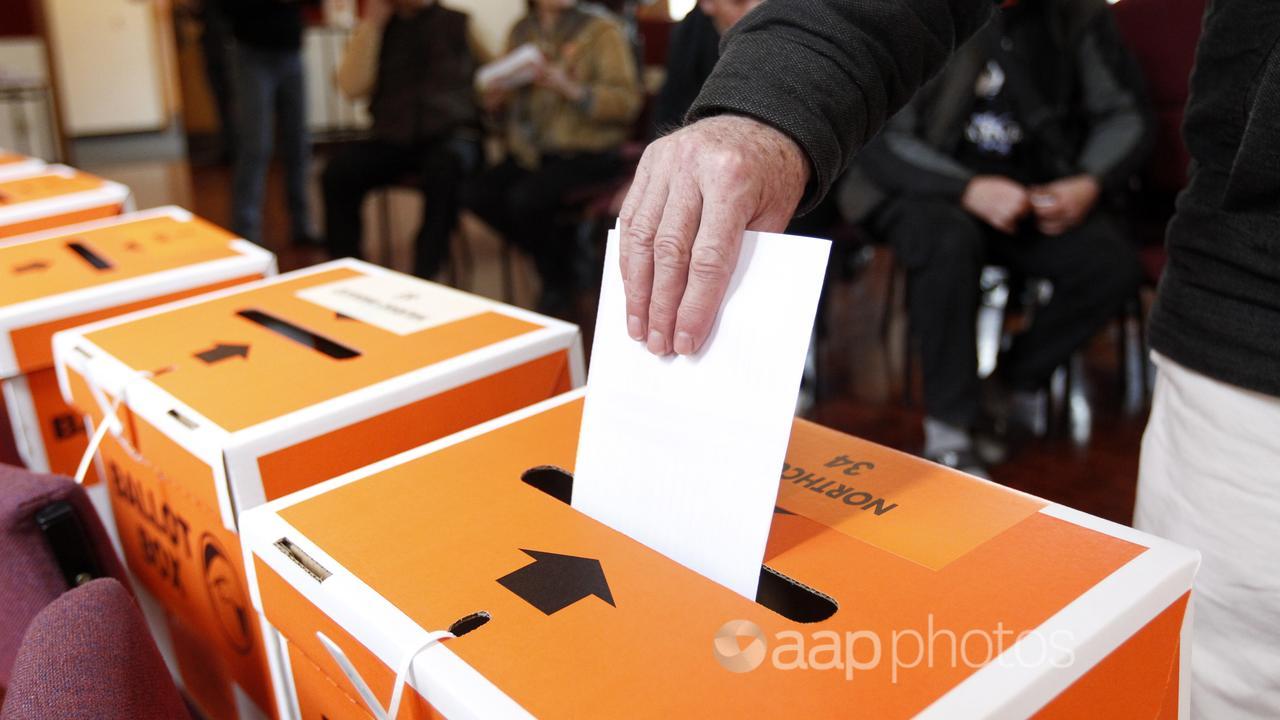A social media video claims New Zealand’s government could use the threat of an epidemic to stop the general election and govern for another three years.
This is false. Legal experts told AAP FactCheck the NZ government cannot on its own delay the October 14 election or formation of the new parliament, even in the event of another epidemic or pandemic.
The claim is made in a Rumble video shared to several Facebook groups, as seen here, here and here.
One of the people in the video refers to section 6 of the Epidemic Preparedness Act 2006, which applies to what happens when an epidemic notice is issued in the event of parliament having been dissolved (video mark 10min 18sec).
They point out NZ’s parliament has been dissolved in preparation for the election and won’t return until after the new MPs are sworn in.
But they claim if the World Health Organization (WHO) issues an epidemic notice before then, a lockdown can be imposed and the Labour government can continue to govern – because the Act says parliament must meet if an epidemic notice is issued.

“The election is not going to be until October 14,” they say (video mark 11min 57sec).
“It could be that after they take six weeks and everything … it could be November, December even before we got parliament back operating again.
“In that case, parliament has to meet, and it can then do what it wants. Basically, it could stop that election occurring. It can sit there for another two years or three years doing what it wants.”
She adds: “That’s what I believe (NZ Prime Minister Chris) Hipkins is cock-a-hoop about. I don’t think they have any fear because they are going to pull it back in again.”
Election law experts say this is an incorrect interpretation of the Epidemic Preparedness Act and does not take into account provisions under the Electoral Act 1993.
Andrew Geddis, a law professor at the University of Otago, told AAP FactCheck claims the Epidemic Preparedness Act permits the recall of parliament before election results are known and allows the government to hold office indefinitely are false.
“Parliament has been dissolved for the 2023 election. There simply is now no parliament to recall,” Prof Geddis said in an email.
He said the claim relates to Section 6(2)(b)(ii) of the Act. The section states if an epidemic notice is issued after parliament has been dissolved, parliament must meet “within 7 days of the return of the writ” – the formal announcement of the election results.
“The MPs who are part of this parliament are then those elected at the election – with the government being made up of the arrangement of parties who have gained a majority at that election,” Prof Geddes said.
“The issuing of a pandemic notice can have no effect on a change of government if the election result produces a new majority for a different set of parties.”
Prof Geddis said if the election was delayed, such as in the event of a pandemic or epidemic making it unsafe for people to vote, the existing government would only continue in a “caretaker” capacity until the election process was completed.
“That is to say, it could continue running things according to existing policies, but could not introduce major new policies or make major decisions without getting general consensus from other political parties.”

Janet McLean KC, a law professor at the University of Auckland, also said the claim was false, pointing out the NZ Electoral Commission would decide when elections occurred if there was a pandemic or epidemic.
“If there were to be an outbreak of an epidemic after parliament ends and electoral writ issued and the subsequent election cannot be safely held – there are some powers in the chief electoral officer to extend time for polling (but the power is not in the prime minister),” Prof McLean told AAP FactCheck in an email.
Prof McLean said there were many prerequisites before the chief electoral officer could use those powers, set out in section 195 of the Electoral Act 1993.
Voting can be adjourned for an initial period of no more than three days, and subsequent periods of no more than seven days each – not the three years suggested in the Facebook claim.
Prof Geddis, referencing the same section of the Electoral Act, also said the government “cannot on its own delay the election, even if it issues a notice under the Epidemic Preparedness Act 2006”.
“It is the chief electoral officer (and only this official) who decides whether voting can safely take place,” he said.
The Verdict
The claim the Epidemic Preparedness Act gives the New Zealand government the power to recall parliament and govern for up to another three years is false.
Electoral law experts told AAP FactCheck the Act has provision for a new government forming in the event of a pandemic or epidemic after the election is held.
If a pandemic or epidemic makes an election unsafe, the chief electoral officer has the power to delay the vote, not the prime minister.
False – The claim is inaccurate.
AAP FactCheck is an accredited member of the International Fact-Checking Network. To keep up with our latest fact checks, follow us on Facebook, Twitter and Instagram.
All information, text and images included on the AAP Websites is for personal use only and may not be re-written, copied, re-sold or re-distributed, framed, linked, shared onto social media or otherwise used whether for compensation of any kind or not, unless you have the prior written permission of AAP. For more information, please refer to our standard terms and conditions.


















